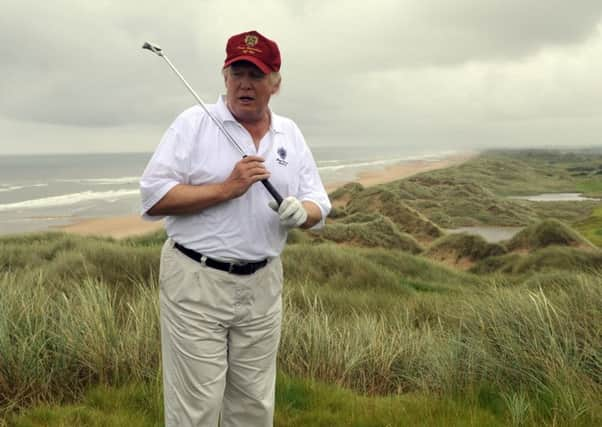Martyn McLaughlin: How Trump Empire uses Orwellian doublethink


The release of the annual accounts for Donald Trump’s Scottish golf resorts inevitably brought a flood of coverage focusing on their multimillion-pound losses, but there was plenty else to digest, not least the dizzying scale of the administrative expenses at the courses (£7.7m) or the extent of the interest-free loans provided by the US president (£149m).
What stood out for me, however, was how the Aberdeenshire branch of his business empire is promoting a disingenuous, self-serving narrative – a trick that has served Mr Trump well in his political career. In a strategic report accompanying the latest annual report for Trump International Golf Links in Balmedie, the 72-year-old’s son, Eric, was at pains to suggest the venture is thriving in spite of the economic factors unique to its location in the north east of Scotland.
Advertisement
Hide AdAdvertisement
Hide Ad“Trump International continues to soar in the world golf rankings, and plays an important part in the global Trump portfolio,” he wrote. “For the fifth consecutive year, the course has been awarded Best Modern Course of Great Britain and Ireland by Golf Week and also was rated as one of the top 50 best courses in the world by Golf Magazine.”
He added: “The crash in oil price and economic downturn experienced in the north east of Scotland has, however, resulted in a drop to local spending and consequently revenues have decreased by three per cent.”
Detailing the “principal risks and uncertainties” facing the business, Eric noted: “The industry is both competitive and challenging, factors that are heightened by the ongoing dip in the local economy, and adverse weather conditions.”
Granted, he may have a point about the dreich climate, but his insistence that the Aberdeenshire economy is continuing to nosedive not only goes against official wisdom, it jars with what the Trumps are saying elsewhere.
Contrary to his gloomy forecast, the outlook for the north east economy is far from pessimistic. Indeed, according to several recent UK Powerhouse studies, Aberdeen has enjoyed the strongest city economy anywhere in Scotland of late.
Earlier this month, an analysis by Aberdeen and Grampian Chamber of Commerce in conjunction with financial firm EY found that £8.4bn of public and private investment is due to be delivered to the north-east before 2030 – the legacy of the region’s diversification away from oil and gas. Describing the situation as buoyant would be rash, but there is a clear sense of an ongoing recovery. Curiously, when it suits them, the Trumps are inclined to agree.
This summer, the Trump Organisation submitted a planning application for a major new development adjoining the course, known as the Trump Estate, which proposes 500 new houses.
An economic assessment of the development, carried out by 4 Consulting, was submitted alongside the planning application. It is a document brimming with optimism, given how it almost proposes a boom not seen in the area since the discovery of North Sea oil.
Advertisement
Hide AdAdvertisement
Hide AdAn entire section is given over to an appraisal of the “high performing” Aberdeenshire economy. emphasising how its size has more than doubled in nominal terms in almost 20 years.
Economic growth, it goes on, has outstripped the Scottish average, with Aberdeenshire outpacing Aberdeen, Glasgow, Edinburgh, and Dundee in terms of growth in the decade since the since the financial downturn.
Now, there is much to scoff at in the economic assessment, such as the claim that Trump’s resort has directly created most of the additional 140 jobs which sprung up nearby in its first four years (in 2013, it employed 66 people; today, the staff roll is 84, down on the 95 it employed in 2015).
But its bright-eyed outlook regarding the economy is well founded, if peculiar. The contrast with Eric Trump’s strategic report could not be more pronounced. At one and the same time, the Trump Organisation and its analysts are pallbearers for Aberdeenshire’s economy, while also acting as its cheerleaders.
Only the Trump Organisation can explain its contradictory assessments, but the most obvious explanation is likely to be the correct one. For all that it has been praised by golfing aficionados as an outstanding example of a modern links course, as a business Trump International Golf Links is mired in the bunker.
In the six years since it opened, it has run up losses of nearly £8.5m (for Turnberry, the figure is £33m). Even then, the profit and loss margins fail to capture the full extent of the resort’s problems. Its turnover for 2017 was down. It was the second successive year it has fallen.
This is not a new resort still finding its feet – not with the Trump imprimatur. It is an established tourism destination which has consistently haemorrhaged money, and which is seeing its revenue shrink. By blaming wider regional economic factors, the Trumps pinpoint a convenient scapegoat for its financial woes. But having taken the opposite tack when trumpeting an associated development, its motives are brazen. The economic assessment bullishly warns if the Trump estate is “not realised”, it “could limit the regional economy’s ability to diversity and grow tourism over the longer term”.
In reality, getting the housing past the planners is the only realistic option to stem the losses at Trump’s ailing resort. No amount of alternative facts can disguise that.
